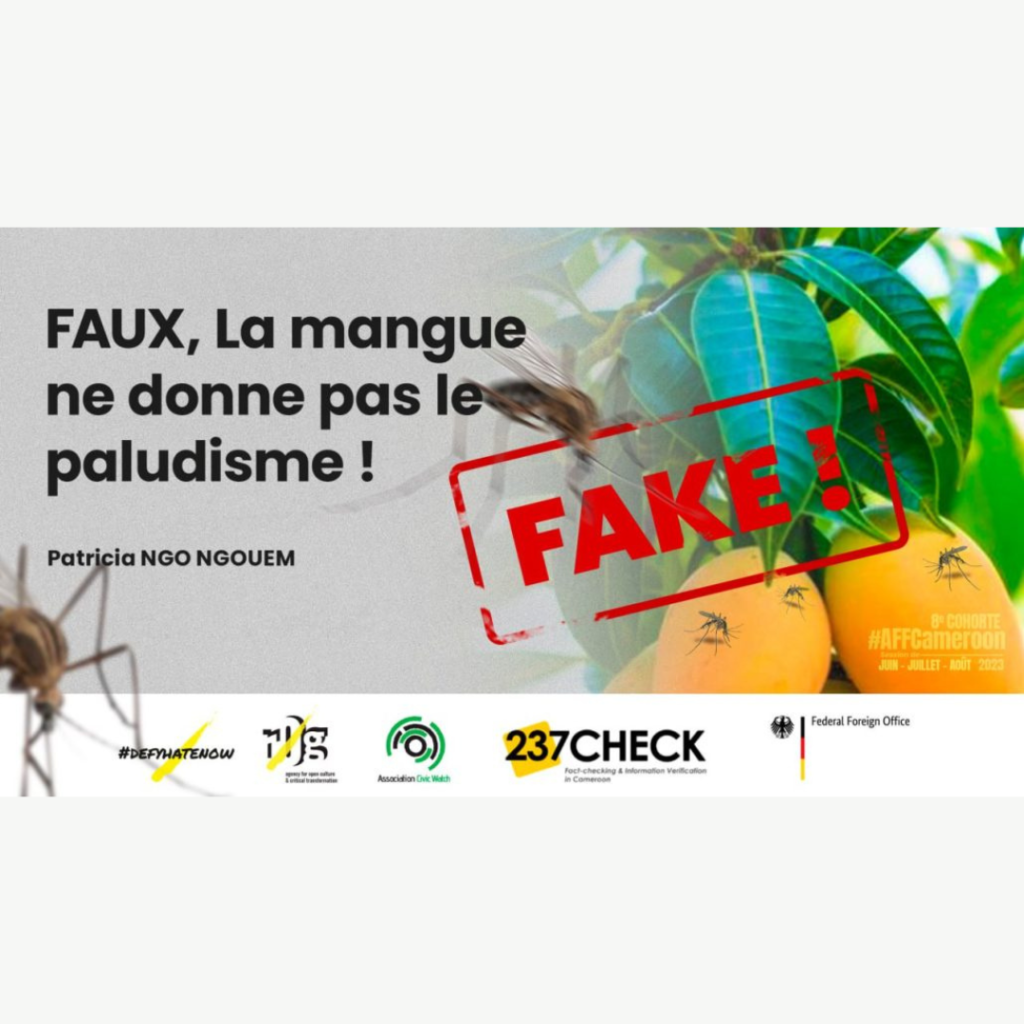A widespread idea in Cameroon suggests that excessive consumption of mango causes malaria. But this assertion is false, as health experts have explained to us.
On May 3, 2023, an Internet user wrote on Facebook: “ Khoooo mango gives malaria, there is already plasmodium in mango??? The doctor wonders… (sic) .”
(POST: https://web.facebook.com/groups/Kerelkongossa/posts/6611562348966967 )

The post was published in “ Kerel Kongossa (official) ”, a private group on Facebook which brings together more than 556,000 members. But this assertion does not date from May 2023. It has already been the subject of publications on social networks in the past. “ Malaria threatens me. C pE etr a cauz D mango ke I snack all the time.. I feel weak (Hear: Malaria threatens me. Maybe it’s because of the mangoes that I snack on all the time. I feel weak)” , posted an Internet user on November 29, 2012 on “ X ” (formerly Twitter).
( POST : https://twitter.com/Shanyah21/status/274091360968134656?s=20 )
“ If it wasn’t Corona that silenced me, it would be malaria. the quantity of mangoes I eat per day there (sic)”, reacted another on April 22, 2020 on the same social network.
( POST : https://twitter.com/_AndreaMD/status/1252917631855755265?s=20 )
Conversely, other Internet users refute this assertion. “ Excess mango does not cause malaria ,” comments this user, for example, in a post on X on April 22, 2020. “ We are in a country where we believe that mango causes malaria… And we are at peace with that !!! », Adds this other, in a publication on the same social network dated April 22, 2022.
(POST: https://web.facebook.com/groups/Kerelkongossa/posts/6611562348966967 )
On its website , the World Health Organization (WHO) defines malaria as a “ potentially fatal ” disease transmitted to humans through the bites of certain types of mosquitoes. “ It is mainly found in tropical countries. It is a preventable and curable disease. The most common early symptoms are fever, headache and chills. Symptoms generally begin within 10 to 15 days following the bite of an infected mosquito ,” informs the UN agency.
The disease is endemic in Cameroon, because it is constantly rampant there with high mortality and morbidity rates in the population, adds Dr Dominique Bomba Amougou, head of the prevention section at the National Malaria Control Program (Pnlp) of the Ministry of Health . Public health ( Minsanté ). According to Minsanté, Cameroon records 6 million cases of malaria and nearly 4,000 deaths in health establishments each year, with children under 5 years old accounting for most of the deaths.
However, not all cases are recorded, and the WHO estimates that nearly 11,000 people die from malaria each year in the country. In 2022, the country’s health facilities reported 3,327,381 cases of malaria, ” or 29.6% of all consultations ” that year, according to a press kit provided to the media on April 25, 2023 by the Pnlp at on the occasion of World Malaria Day , which we consulted. It was also a few days after that day that this widespread idea resurfaced on the Web.
But who is telling the truth in the end?
We verified this information and found it to be false
We interviewed Dr Aurélien Nana, a public health doctor, who maintains that this assertion is false. “ Eating a mango does not cause malaria. Malaria is a disease transmitted by a mosquito called anopheles, and it is mainly the female who is responsible. To multiply, its larvae need a favourable environment: stagnant water, trash and rubbish, etc. », Explains the practitioner.
He recalls that in Cameroon, the mango season begins with the arrival of the rains and it is precisely during this period that puddles proliferate and stagnate in the gutters and around homes. “ With the consumption of mangoes, their waste litters the ground around certain homes. This constitutes fertile ground for the development of mosquito larvae, and therefore the increase in cases of malaria,” continues the doctor.
Dr Dominique Bomba Amougou, head of the prevention section at Minsanté-Pnlp, affirms that there is, to date, no scientific evidence establishing a causal link between mango and malaria. “ It seems above all that this is linked to the fact that the rainy season coincides with the mango season and the increase in the peak of malaria transmission, a period during which we see an increase in stagnant water which is an ideal environment for the reproduction of mosquitoes. This is why in our villages, culturally, we often think that mangoes cause malaria. You can suck as many mangoes as you want, you will never get malaria,” he says.
Claude Abe, sociologist and teacher at the Catholic University of Central Africa (UCAC), explains that this statement is part of the “ collective imaginations ” that each society creates. “ Malaria is a disease which is recurrent from the point of view of the demography it affects, people wanted, at a given moment, to bring malaria into daily banality by putting in place a popular and secular theory of the cause of the disease. Hence precisely the excessive consumption of mangoes appeared very easily in the minds of many as being the element which could be at the origin of this disease even if, on the medical aetiology, the two elements have nothing to see together,” he explains.
For the latter, this “ popular theory ” persists in particular because of “ ignorance ” or “ insufficient knowledge ” of the origin of malaria. The sociologist is, however, convinced that we can combat this preconceived idea. This is “by making scientific knowledge more available by popularizing it so that we are all at the same level of knowledge, by also demonstrating the virtues of the mango, its consumption, all the various uses that can be made of it, at the same time beyond these inventions very far from reality. In this type of imagination, there is only exact, scientific, assured and secure knowledge that can overcome it,” he maintains.
In summary, the idea that excessive consumption of mango causes malaria is false. It is a disease transmitted to humans by the bite of a mosquito called Anopheles.
Article written by Patricia Ngo Ngouem ( StopBlaBlaCam ) as part of the Africa Fact-checking Fellowship Cameroon (#AFFCameroon), cohort 8 of #defyhatenow.
Other Fact checks
- Breast cancer prevention stereotype
- Okrika Second Hand Cotton Dresses are Infected with COVID-19
- Reproductive Tech: Babies Can’t Grow Outside The Womb
- North Cameroon Schools under Attack
- Marburg Virus Scare, Cameroon
- Health Benefits of African Panacea, Beware of False Advertising
- Kamto Accuses Government For Human Right Violation
- Death rumors of Chief Sokoudjou, untrue
- Fake News: Man Transforms into Snake and Swallows Girl
- Corpse Discovery of a Man in his 40s in Bamenda Under Suspicious Circumstances is True
- The Article “Welcome to Yaounde” by TGP Newspaper is Misleading
- Cameroon- Native Doctor Mistakenly Makes His Client’s (Pastor) Picture Go Viral –

